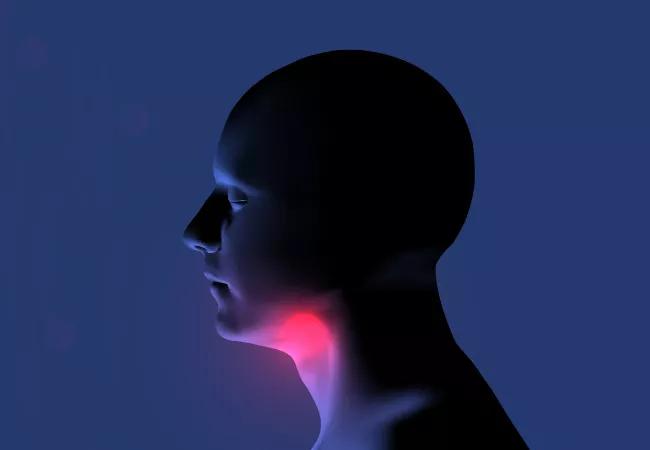Esophageal Center offers unique one-stop, multidisciplinary care

Esophageal disorders affect more than 15 million Americans — including both medical and surgical cases, from Barrett’s esophagus and early esophageal cancer to gastroesophageal reflux disease (GERD), esophagitis, esophageal motility disorders such as achalasia, and other rare esophageal disorders.
Advertisement
Cleveland Clinic is a non-profit academic medical center. Advertising on our site helps support our mission. We do not endorse non-Cleveland Clinic products or services. Policy
That’s why Cleveland Clinic’s Esophageal Center, opened in late 2016, has unique offerings for referring physicians and their patients, says Medical Director Prashanthi N.Thota, MD.
“Our goal is to provide a multidisciplinary approach involving gastroenterologists, foregut surgeons, thoracic surgeons, pathologists, radiologists and oncologists in the diagnosis and treatment of all types of esophageal diseases, and to offer interventions that are not typically available in the community setting,” she explains.
Here is a look at several novel diagnostic techniques and treatments now available, as well as what research is currently underway:
One innovative technique being offered by the Esophageal Center is transoral incisionless fundoplication (TIF) for the treatment of GERD in non-obese patients. According to John Rodriguez, MD, Director of Surgical Endoscopy: “Regular surgical fundoplication requires an incision in the upper abdomen. TIF is less invasive and is done through the mouth as an outpatient procedure with minimal postoperative recovery time.” The procedure is very effective, with similar results to surgery and medication for GERD patients. In addition, TIF may be an option for patients with small hernias (<2 cm), he says.
For patients with Barrett’s esophagus and early esophageal cancer, Dr. Thota offers both cutting-edge diagnostic techniques and treatments. For example, in patients with Barrett’s esophagus and dysplasia, instead of performing surveillance endoscopies, ablation can be offered to greatly reduce the risk of progression to cancer.
Advertisement
“As a research and multidisciplinary center, we are able to adopt the latest techniques and standards to offer optimal care to patients,” Dr. Thota says. “We get a lot of patients who come to us for third and fourth opinions, and referrals from physicians who aren’t sure how to proceed with a case. And that’s what we’re here for.”
The Esophageal Center is offering several new procedures for the management of Barrett’s esophagus and dysplasia, such as radiofrequency ablation, endoscopic mucosal resection and cryotherapy using truFreeze® cryospray, the Coldplay cryoballoon and the hybrid APC thermal ablation procedure. “These techniques can destroy the diseased tissue while leaving the underlying healthy tissue untouched,” she says.
In the area of research, the Esophageal Center is evaluating cutting-edge diagnostic and therapeutic innovations.
“We are doing an NIH-funded study looking at use of balloon cytology to diagnose Barrett’s esophagus and esophageal cancer,” Dr. Thota says. “This technique is much less invasive and costly than standard endoscopy for diagnosis. We have a patient come to the office to swallow a string with a balloon attached to it. We then inflate the balloon, obtain a cytology sample on the balloon’s surface, and deflate the balloon. It takes 5 minutes.” In an earlier multicenter study with 41 patients in which Cleveland Clinic participated, results were promising.
In addition, the center is doing a WATS3D brush cytology study; this biopsy procedure obtains a transepithelial specimen for computer-assisted, 3D analysis. It has been shown to improve detection of Barrett’s esophagus and dysplasia over the standard forceps biopsy.
Advertisement
“We see over 2,000 patients a year in our center, and patients and physicians can benefit from the extensive experience of Cleveland Clinic’s team,” reports Dr. Thota. “Our goal is to help patients to receive early diagnosis and treatment of esophageal diseases and disorders to prevent deterioration and the need for major surgery.”
If you would like to refer a patient with esophageal motility disorders, refractory GERD or Barrett’s esophagus with dysplasia and early cancer, please contact the esophageal center at 216.444.0780 or email esophagus @ccf.org.
Advertisement
Advertisement

Benefits of neoadjuvant immunotherapy reflect emerging standard of care

Multidisciplinary framework ensures safe weight loss, prevents sarcopenia and enhances adherence

Study reveals key differences between antibiotics, but treatment decisions should still consider patient factors

Key points highlight the critical role of surveillance, as well as opportunities for further advancement in genetic counseling

Potentially cost-effective addition to standard GERD management in post-transplant patients

Findings could help clinicians make more informed decisions about medication recommendations

Insights from Dr. de Buck on his background, colorectal surgery and the future of IBD care

Retrospective analysis looks at data from more than 5000 patients across 40 years